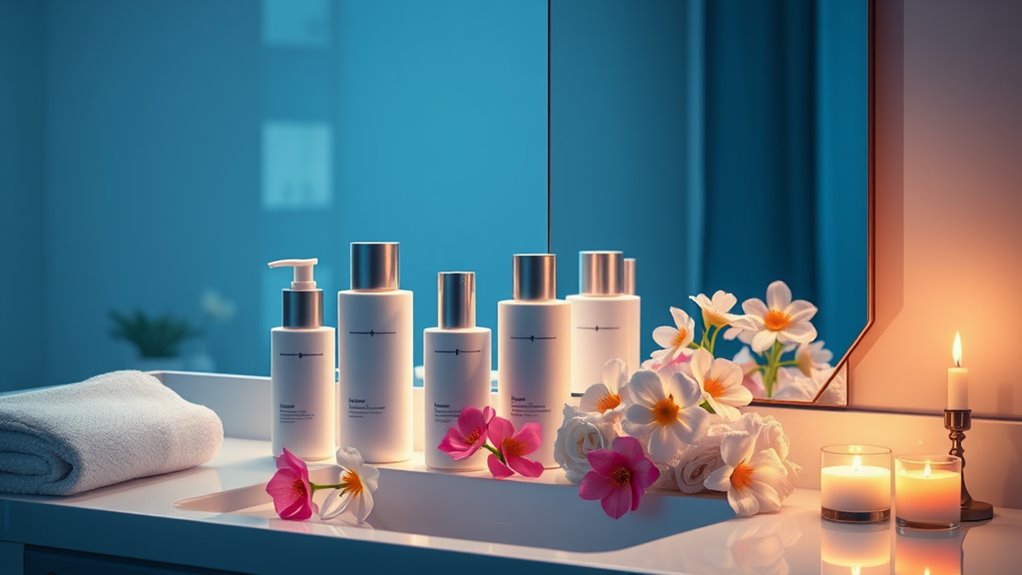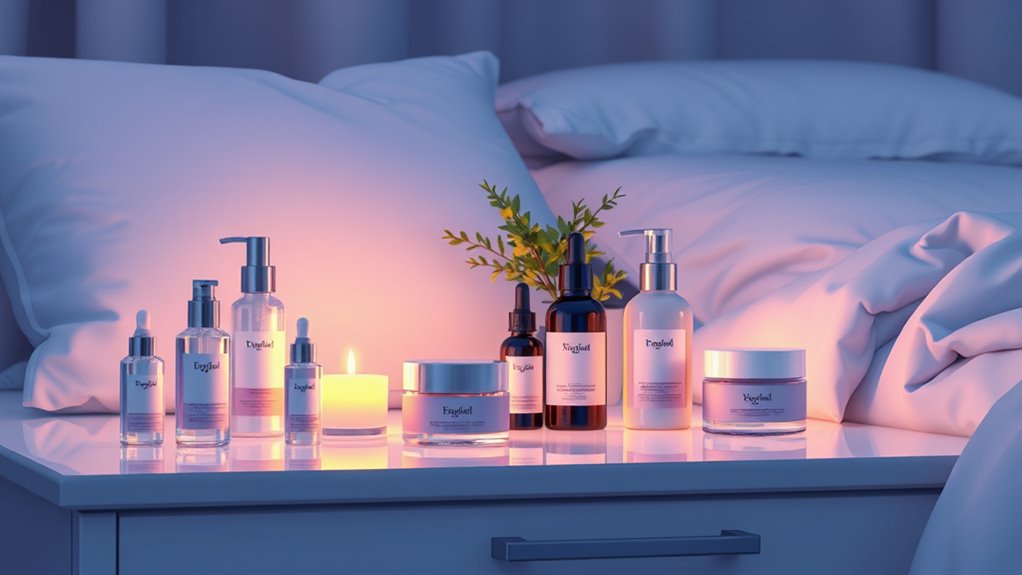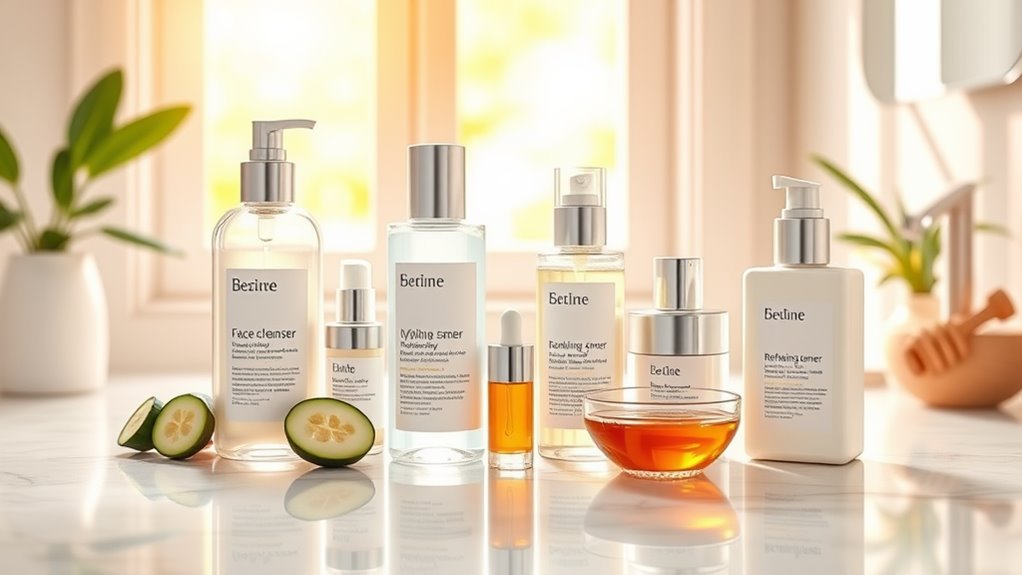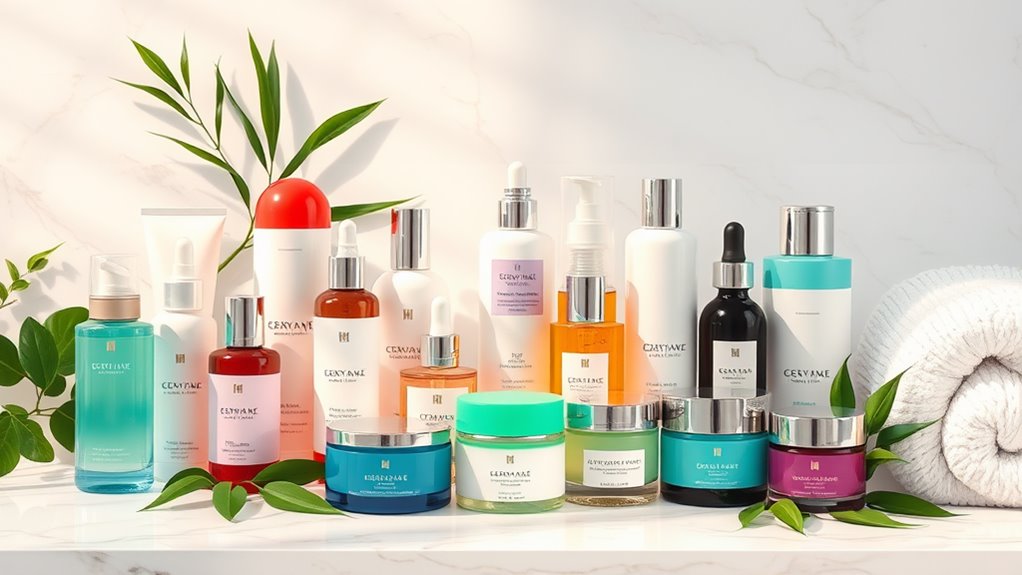The Best Night Skincare Routine for Waking Up Glowing
If you want to wake up with glowing skin, establishing an effective night skincare routine is essential. Start with a gentle cleanse to rid your skin of the day’s impurities. Exfoliating a few times a week can enhance this process, but that’s just the beginning. There’s more to reflect upon, like toners and serums that target your specific needs. Curious about how each step contributes to your complexion? Let’s explore the details.
Key Takeaways
- Start with a gentle cleanser to remove impurities, ensuring your skin is clean and ready to absorb subsequent products.
- Exfoliate 1-3 times a week to enhance skin texture and reveal a fresh, radiant complexion.
- Apply a toner to balance pH levels, promoting a healthy glow and minimizing irritation.
- Use targeted serums for specific concerns, like vitamin C for brightening or hyaluronic acid for hydration, before moisturizing.
- Finish with a nourishing night mask to lock in moisture and support skin recovery overnight for a revitalized appearance by morning.
Cleansing: The Foundation of Healthy Skin
Cleansing your skin at night is essential, as it removes dirt, oil, and makeup that accumulate throughout the day. This step lays the groundwork for effective night skincare.
Begin with a gentle cleanser tailored to your skin type; this guarantees you’re not stripping away essential moisture. Massage the cleanser in circular motions for about a minute, allowing it to penetrate deeply and lift impurities. Rinse thoroughly with lukewarm water, avoiding extremes that could irritate your skin.
For an added boost, consider a second cleanse if you’ve worn heavy makeup or sunscreen. Remember, a well-cleansed face enhances the absorption of subsequent products, maximizing your night skincare routine’s effectiveness. Additionally, poor sleep can exacerbate skin issues, so ensuring a clean canvas is vital for rejuvenation.
Prioritize this nightly ritual, and you’ll wake up with refreshed, radiant skin.
Exfoliation: Removing Dead Skin Cells
While you might think cleansing is enough, exfoliation plays an essential role in your night skincare routine by removing dead skin cells that can dull your complexion.
Incorporating exfoliation helps reveal fresh, radiant skin beneath that layer of buildup. You have two main options: physical exfoliants, which use granules or tools to slough off dead skin, and chemical exfoliants, which utilize acids or enzymes to dissolve the bonds holding dead cells together.
Choose a method that suits your skin type and concerns. Aim to exfoliate 1-3 times a week, depending on your skin’s sensitivity. Consistent exfoliation not only enhances your skin’s texture but also boosts the efficacy of your other skincare products, ensuring you wake up glowing each morning.
Toning: Balancing Your Skin’s Ph
Toning is essential for maintaining your skin’s pH balance, which helps keep it healthy and glowing.
When choosing the right toner, consider your skin type and specific needs. Incorporating ingredients like natural brightening agents into your toner can further enhance your skin’s radiance by reducing the appearance of dark spots.
Let’s explore some effective application techniques to get the most out of your toner.
Importance of Ph Balance
Achieving a balanced pH is essential for maintaining healthy skin, as it helps protect your skin’s natural barrier and prevents issues like irritation and breakouts.
When your skin’s pH is off-kilter, it can lead to dryness or oiliness, triggering an imbalance that fosters acne or sensitivity. A well-balanced pH enhances skin function, allowing it to retain moisture and defend against environmental aggressors.
Incorporating toners tailored to your skin type can help restore that balance, ensuring your skin stays in prime condition. By prioritizing pH balance, you’re not just treating your skin; you’re empowering it to thrive.
A balanced pH sets the stage for your entire skincare routine, promoting a radiant complexion that glows with health.
Choosing the Right Toner
Finding the right toner can considerably impact your skincare routine. It helps balance your skin’s pH, preparing it for the next steps. Here’s a quick guide to help you choose:
| Skin Type | Recommended Toner |
|---|---|
| Oily | Salicylic Acid or Witch Hazel |
| Dry | Hydrating or Rose Water |
| Combination | Glycolic Acid or Chamomile |
Identify your skin type and select a toner that addresses your specific needs. Look for alcohol-free options to minimize irritation. If you’re targeting specific concerns like acne or aging, consider toners with active ingredients. By carefully choosing the right toner, you’ll enhance your overall routine, ensuring your skin feels balanced and revitalized.
Application Techniques Explained
When it comes to applying toner, using the right technique can make all the difference in balancing your skin’s pH.
Start by cleansing your face thoroughly to remove impurities. Next, soak a cotton pad with your toner, guaranteeing it’s damp but not dripping. Gently swipe the pad across your face, moving from the center outward. This method promotes even distribution and guarantees all areas of your skin benefit from the toner.
If you prefer, you can also use your hands; simply pour a few drops into your palms, then press them onto your skin. This technique encourages deeper absorption.
Serums: Targeting Specific Skin Concerns
As you immerse yourself in the world of night skincare, serums can become your secret weapon for targeting specific skin concerns.
These concentrated formulations deliver active ingredients that penetrate deeply, addressing issues like hyperpigmentation, fine lines, or acne. Choose a serum based on your skin’s unique needs; for instance, a vitamin C serum brightens and evens out skin tone, while a hyaluronic acid serum boosts hydration and plumps your complexion.
Incorporate retinol to promote cell turnover and reduce signs of aging. Additionally, look for proven ingredients that can help fade dark spots effectively. Apply serums after cleansing and before moisturizing for maximum efficacy.
Moisturizing: Hydration for Overnight Repair
Moisturizing is essential for achieving overnight skin repair and hydration, and it should be a non-negotiable step in your nighttime routine.
Selecting the right moisturizer can transform your skin’s texture and appearance by locking in moisture and preventing Trans-Epidermal Water Loss. Look for formulations rich in hyaluronic acid, glycerin, and ceramides, which help draw in water and restore your skin barrier.
Apply your moisturizer after your serums, using gentle upward strokes to promote circulation and absorption. Don’t forget to focus on areas prone to dryness.
Eye Cream: Nourishing the Delicate Area
A good eye cream is essential for addressing the unique needs of the delicate skin around your eyes. This area, thinner and more vulnerable than the rest of your face, craves specialized nourishment.
Look for ingredients like peptides, hyaluronic acid, and antioxidants, as they help combat fine lines, puffiness, and dark circles. When applying, use your ring finger—it’s the gentlest—to tap the cream lightly around the orbital bone. This technique promotes absorption without tugging at your skin.
Consistency is key; make eye cream a non-negotiable part of your nightly routine. With time, you’ll notice a more radiant, youthful appearance. Avoiding common eye care mistakes guarantees that your eyes reflect the same glow you aim for throughout your entire skincare regimen.
Night Masks: Sealing in the Benefits
Night masks are a game changer for locking in moisture and nutrients while you sleep.
When choosing the right formula, consider your skin type and specific concerns to maximize the benefits.
With the right night mask, you’ll wake up to refreshed, radiant skin.
Benefits of Night Masks
Using a night mask can greatly enhance your skincare routine by sealing in moisture and nutrients while you sleep.
These masks create a barrier that locks in hydration, helping your skin recover from daily stressors. By applying a night mask, you’re allowing active ingredients to penetrate deeply, promoting cell renewal and improving skin texture.
You’ll notice reduced signs of fatigue, as night masks often contain antioxidants that combat free radicals. Additionally, they can address specific concerns like dryness, dullness, or uneven tone, giving your skin a revitalized appearance by morning.
Incorporating a night mask into your routine isn’t just a luxury; it’s a strategic move towards achieving that healthy, glowing complexion you desire.
Embrace the benefits and wake up transformed!
Choosing the Right Formula
When selecting the right formula for your night mask, consider your skin type and specific concerns to maximize its benefits.
Here are three key factors to guide your choice:
-
Hydration Needs: If your skin feels dry or flaky, opt for a mask with hyaluronic acid or glycerin to lock in moisture.
-
Targeted Treatments: For acne-prone skin, look for ingredients like salicylic acid or tea tree oil that help combat breakouts while you sleep.
-
Anti-Aging Properties: If you’re focused on reducing fine lines, choose a mask with retinol or peptides to stimulate collagen production overnight.
Frequently Asked Questions
How Often Should I Change My Pillowcase for Better Skin?
You should change your pillowcase at least once a week. This helps prevent the buildup of oils, dirt, and bacteria that can contribute to breakouts, ensuring your skin stays fresh and clear while you sleep.
Can I Skip Moisturizer if I Have Oily Skin?
You can’t skip moisturizer, even with oily skin. It helps maintain hydration balance and prevents your skin from overproducing oil. Choose a lightweight, non-comedogenic formula to keep your skin healthy and glowing.
Is It Necessary to Use a Separate Night Cream?
Using a separate night cream isn’t strictly necessary, but it can enhance your skin’s hydration and repair overnight. If you seek targeted benefits, incorporating one might elevate your skincare game considerably. Consider your skin’s unique needs.
What Ingredients Should I Avoid at Night?
You should avoid ingredients like retinol, AHAs, and BHAs if you’re sensitive, as they can cause irritation overnight. Heavy fragrances and alcohol might disrupt your skin’s repair process, so choose calming, hydrating alternatives instead.
How Long Before Bed Should I Apply My Skincare?
You should apply your skincare about 30 minutes before bed. This gives your skin time to absorb the products effectively, ensuring maximum benefits while you sleep, so you wake up refreshed and radiant.
Conclusion
By following this night skincare routine, you’re setting yourself up for a glowing complexion by morning. Start with a gentle cleanse, exfoliate regularly, and balance your skin with toner. Don’t forget to apply targeted serums and a nourishing moisturizer. Treat your eyes with a dedicated cream, and finish with a hydrating night mask to lock in all the benefits. With consistent care, you’ll wake up looking refreshed and radiant, ready to face the day!





